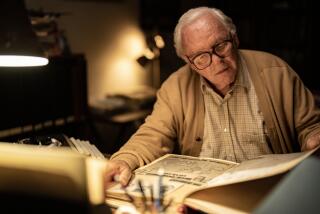Book review: ‘Fiasco’ by Imre Kertész
In 1944, a 14-year-old boy, future novelist Imre Kertész, was rounded up while on an excursion in the countryside near Budapest and sent to Auschwitz. And then to Buchenwald. Surviving the camps and returning to Budapest, he was asked, simply, by his surviving family and friends, “Where have you been?”
In his work, Kertész reflects on how quickly he discovered that no one really wanted to know what he had experienced. And yet, Kertész’s entire literary life has been an attempt at answering that simple question in the trilogy of novels, “Fatelessness,” “Fiasco” and “Kaddish for an Unborn Child” — an attempt that earned him the Nobel Prize in Literature in 2002. His other books describe in particular detail his dreary survival under the communism in Hungary.
Finally published in an English translation, “Fiasco” is actually the middle book of the trilogy and describes, in the opening third, the fictionalized experiences Kertész must have had in writing “Fatelessness” — having it rejected by a publisher as being unsuitable for publication. “As I now see clearly, to write a novel means to write for others — among others, for those who reject one,” he muses. The later parts of “Fiasco” follow a writer very much like Kertész who is going about his life in the tediously circumscribed environment of communist Hungary.
Although “Fiasco” is outwardly a little off-putting — in Kertész’s style, the reader encounters parenthesis upon parenthesis — the writer also succinctly explains how he could write about his awful experiences as a child that he described in “Fatelessness” and still remain faithful to his 14-year-old self’s search for adventure and beauty amid the horror of the concentration camps.
Now, in translator Tim Wilkinson’s handling, “Fiasco” completes the trilogy for English readers, a trilogy that is one of the best renderings of what it must have been like to survive a Nazi murder camp. As Kertész writes in “Fiasco,” he could not avoid a responsibility “to transmit, in my own way, according to my own lights; to transmit the material that was possible for me, my own material, myself.… however, there was one thing that, perhaps naturally enough, I did not think of: we are never capable of interpreting for ourselves. I was taken to Auschwitz not by the train in the novel but by a real one.”
McGonigle is the author of the novel “The Corpse Dream of N. Petkov.”
More to Read
Sign up for our Book Club newsletter
Get the latest news, events and more from the Los Angeles Times Book Club, and help us get L.A. reading and talking.
You may occasionally receive promotional content from the Los Angeles Times.






